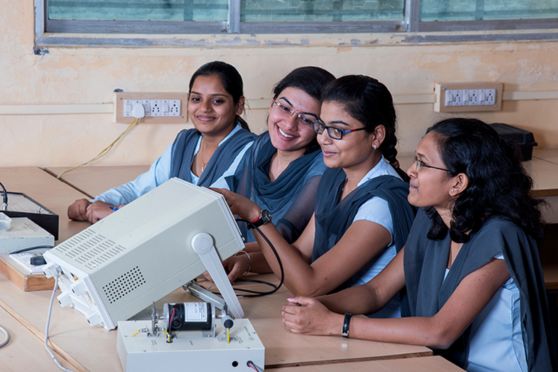STEM: Why an early educational investment is essential for girls in India


As the Chandrayaan-3 landed on the moon last month, India erupted in a wave of fanfare. Soon after, the internet started buzzing with photos of women who had worked directly on the mission. But once the celebration dies down and life goes back to normal, what are the opportunities for girls who would like to grow up to be the next Vanitha Muthayya and Dr. Ritu Karidhal?
According to World Bank data, across 107 of 114 economies, there are fewer female STEM graduates than their male counterparts. Globally, only 18% of girls in tertiary education pursue STEM studies, compared to 35% of boys. Moreover, within the STEM domain, women tend to favour life sciences, with lower representation in computer science, mechanical, and electrical engineering. Global statistics further reveal that only 33% of researchers are women, and a mere 22% are professionals in artificial intelligence, with 28% being engineering graduates.
However, amidst these challenges, a silver lining is emerging. STEM is slowly transforming from a trendy hashtag into a powerful movement, encouraging more women to explore the world of science and technology. A report published by the United Nations in 2020 states that 43% of all graduates in STEM fields in India are women—the highest in the world. However, the report also highlights that only 14% of 280,000 scientists, engineers, and technologists employed in research institutions in the country are women.
In India, nearly 43% of all STEM graduates are women, but they constitute only 14% of scientists, engineers, and technologists in research development institutions and universities.
India is among the top producers of scientists and engineers globally, with STEM witnessing substantial growth in recent years.
STEM education equips girls with vital skills, fosters creativity, and prepares them for a rapidly evolving job market. Creating pathways for girls to embrace STEM at a young age and providing exposure to allied careers is paramount. When women have equal opportunities to excel in fields traditionally dominated by men, it levels the playing field.
Despite the potential, significant obstacles created by societal norms and stereotypes often deter girls from pursuing STEM. The absence or lack of female role models and mentors obstructs their aspirations. Traditional gender roles, patriarchal hiring practices, and societal pressures of conformity solidify these obstacles.
STEM can serve as a catalyst, especially for girls from underserved communities. It has the potential to break long-standing barriers and stereotypes related to women’s participation. Furthermore, as girls become changemakers, it can translate into a reduction in generational poverty and contribute to a better and brighter future with the help of innovation and technology. A robust STEM education produces innovators, problem-solvers, and critical thinkers.
The key lies in project-based learning that goes beyond textbooks and encourages creating, fixing, and breaking things. A space where curiosity is appreciated and mistakes are allowed. It involves creating a receptive ecosystem where parents and other stakeholders support girls in their journeys to help bridge the distance between aspirations and reality.
Out-of-school programmes designed to deliver STEM education work best when they intentionally center the ideas of the girls and young women they cater to and treat them as active participants versus passive recipients. Coming out of these programmes, girls feel better positioned to undertake their journey toward a career in STEM.
Empowering girls in STEM isn’t just about gender equity; it’s about shaping a brighter future for India. A society where girls and women don’t just exist but thrive in STEM careers stands to contribute meaningfully to the nation’s progress and development.
About The Author
Jayanthi Pushkaran is the Senior Programme Officer, of Adolescent Girls at EMpower. She plays a critical role in building out the girls’ portfolio in India, including leading and managing the expansion of The Adolescent Girls Learning Community Initiative and The Girls Advisory Council Framework. Prior to joining Empower, Jayanthi worked at the National Institute of Science Technology and Development Studies and Delhi Greens. She acquired an M.Phil degree in Science and Public Policy from Jawaharlal Nehru University and a Master’s degree from the University of Delhi, in Environmental Sociology. She is based in New Delhi.